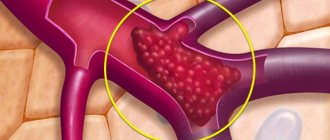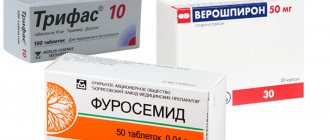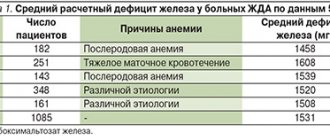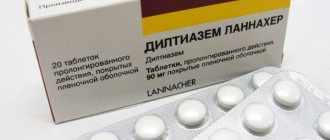08/23/2018 Medicines
The modern rhythm of life suggests that a successful person does not have the opportunity to relax or fully rest. Constant stress, tension, psychological overload and lack of sleep cause the development of pathological processes in the body. Insufficient sleep results in insomnia and a nervous breakdown. Such symptoms appear especially often in women and people with a hereditary predisposition. Sedative medications help to cope with such a serious condition.
How sedatives work
Sedatives are all medications that are taken to calm and stabilize the central nervous system. Inhibition of processes in the central nervous system has a complex effect:
- The level of aggression decreases;
- Irritability disappears;
- The patient does not feel excessive sensitivity;
- Heart rate decreases;
- Sweating decreases;
- Spasmodic pain recedes.
During treatment, you need to check the compatibility of medications with other medications taken, since the components included in the composition can enhance each other and cause an overdose.
Mild sedatives are available without a doctor's prescription. As a rule, these are dietary supplements or homeopathic remedies. More serious medications are sold only by prescription, and some of them are approved for use only in a hospital setting under the supervision of a specialist.
Purpose
If a healthy person takes antidepressants, there will be no effect . Taking them will help a patient with depression:
- improve psychological state;
- get rid of irritability;
- panic fear;
- increase mental and physical activity;
- overcome sad mood.
Psychiatrists prescribe antidepressants for chronic back pain and headaches. And also for irritable bowel syndrome, incontinence and other cases when the body stops producing its own painkillers. Taking medications helps restore pain suppression mechanisms.
take these medications only with a doctor's prescription, since many of them are strong stimulants . Self-prescription may be expensive and may worsen the condition. Only a doctor will correctly calculate how much medicine to take per day. with a psychotherapist is required .
Indications for use
Sedatives of varying intensity are prescribed to adults and children when diagnosing nervous system disorders.
For adults
Most often, the underlying factors for taking sedative medications are:
- Rapid irritability;
- Headaches, the etiology of which is not related to other diseases;
- Lack of control over emotions;
- Outbursts of aggression, rage;
- Sleep disturbance, regardless of the cause of the symptom.
Drugs for sedation are prescribed to people for diseases accompanied by severe itching, burning, pain, that is, in situations where the human body cannot relax in order to rest.
For children
Every parent knows that children are very active. Normally, morning mobility decreases towards daytime sleep, when the child is tired physically and from the impressions received. The same thing happens after lunch. However, in some cases symptoms such as:
- Anxiety;
- Tearfulness;
- Hyperactivity without a break for sleep;
- Hysterics;
- Capricious behavior.
If manifestations are not observed often, there is no need to worry - this may be a reaction to the parents’ reluctance to please any whim or a consequence of severe fatigue. But when symptoms appear every day, you need to consult a doctor, as they indicate improper development of the central nervous system.
Sedatives help stabilize the central nervous system and ensure that the child has proper rest. Naturally, these drugs are much gentler than products for adults, but you should not abuse them.
Pregnant
A special category of patients who are prescribed sedative medications are pregnant women. There may be several indications for such a prescription:
- Severe anxiety about the health of your baby;
- Late insomnia;
- Strong emotionality or impulsiveness at any time;
- Nervousness caused by lack of vitamins;
- Constant bad mood.
Many medications can harm the unborn child, so treatment of a pregnant woman with medications throughout the entire period of gestation is carried out only when there is a real risk to the health of the mother or fetus. Typically, pregnant women are prescribed herbal teas, aromatherapy and other methods of finding harmony with their condition.
Sedatives
All sedatives can be divided into hypnotics and sedatives.
The latter are prescribed by a doctor for disorders of the nervous system. The sedative effect is based on inhibition of central nervous system processes. Medicines are produced in the form of tablets, capsules, drops, and tinctures. A common side effect of drugs in any form and with any composition is mild drowsiness due to a slowdown in the rhythm of the cerebral cortex. Despite the fact that sedatives are not classified as sleeping pills, they speed up the process of falling asleep due to a decrease in the excitability of the central nervous system.
Regardless of the reasons, it is not recommended to prescribe yourself sedatives - this is done only by a doctor after a comprehensive examination, identifying the cause of the disease, selecting the optimal treatment and focusing on the current state of the body. In addition, if tablets or infusions were previously prescribed to get rid of neurosis or neurasthenia, this does not mean that they will be suitable for treatment next time.
Sleeping pills
Sleeping pills are necessary for patients who suffer from various sleep disorders.
The intensity is selected according to the etiology of insomnia and the complexity of its development. Strong sleeping pills are prescribed in rare cases and are available only with a prescription. Pharmacy kiosks offer a variety of medications to stabilize sleep, with sedative effects of varying strength. Most of them are based on herbal ingredients, but there are completely synthetic formulations for people prone to allergic reactions. Each drug has its own characteristics:
- Speed of falling asleep;
- Duration of action;
- Age restrictions;
- Recommendations and contraindications;
- Compatibility with other drugs;
- Reasons for admission.
Some patients need sleeping pills to get rid of insomnia as a pathological condition, while others need a fast-acting remedy to quickly get used to changing time zones, while others just need to “survive” the flight. Only a neurologist or somnologist will help you choose a medicine after diagnosing the disease and a detailed study of the symptoms.
You also need to understand that some sedatives have a cumulative effect, others are addictive, and an overdose can be fatal. Therefore, you must approach this treatment method with caution, consult your doctor before visiting the pharmacy and strictly follow the dosage prescribed in the instructions. If for some reason the product does not help, you should choose a drug based on other active ingredients.
Sedatives available without a doctor's prescription
In many cases, nervousness and excessive excitability indicate the development of pathological processes, such as:
- Hormonal disbalance;
- Disturbances in the functioning of the cardiovascular system;
- Mental disorder;
- Diseases of internal organs.
If you ignore these prerequisites and take medicine “for nerves,” there is a chance that the disease will be detected only at a late stage of development, when treatment becomes difficult. For this reason, it is not recommended to take over-the-counter medications to calm nervousness without prior examination. But if such a decision is nevertheless made, it is necessary to study the issue in detail in order to understand what can be expected from taking sleeping pills.
Medicines classified as sedatives have a short list of side effects that are rare. They are not addictive, have an additional analgesic effect, extremely rarely lead to an overdose, and are sold without a prescription. Most often they are used for nervousness, migraines associated with difficult life situations - problems at work, passing exams.
Before buying any sedative, you should read the list of indications, contraindications, and side effects. Particular attention should be paid to compatibility with other drugs. If any existing contraindications are detected, another drug should be chosen.
How is depression treated?
Depression has been treated in different ways. In the ancient world - emetics and laxatives. In the Renaissance - wine and sunbathing. In the Age of Enlightenment - external irritants, for example, insects. The 19th century brought new recipes - in particular, a solution of camphor in tartaric acid. The treatment also included taking drugs that are now no longer allowed for sale, and some are recognized as narcotic.
Obviously, all these drugs had no effect on increasing the amount of serotonin. And the treatment consists precisely in normalizing its production. This was done after the creation of modern antidepressants , which have a minimum of side effects, are safe for the body and are not addictive. These are medications action is aimed specifically at equalizing the disturbed balance of neurotransmitters: serotonin, norepinephrine, dopamine.
Sedatives
All sedatives and sleeping pills, as well as some dietary supplements and homeopathic remedies, have a sedative effect. If the problems are not very pronounced, are associated with temporary difficulties or general weakening of the body, for example, after surgery, you can choose names that are not medications.
Taking serious sedatives comes with a number of risks, as they have a long list of side effects and are addictive. Only a specialist can prescribe treatment.
Classification of sedatives
Based on their origin, sedatives that are widely used in clinical practice are grouped into the following classes:
- herbal preparations: valerian extract, motherwort tincture, peony tincture, hawthorn tincture, passionflower extract, mint herb, lemon balm herb and combinations thereof;
- synthetic drugs: sodium bromide, potassium bromide, magnesium lactate, magnesium sulfate, phenobarbital.
In addition, many psychoactive substances can have a sedative effect and reduce the level of irritability. These drugs include anxiolytics (tranquilizers), antidepressants, some antipsychotics, as well as antiarrhythmic and antihypertensive drugs (for example, the β-blocker propranolol) and antihistamines and antiallergic drugs (for example, diphenhydramine).
Herbal sedatives
Medicines consisting only of herbal components are among the safest.
They are prescribed for treatment for children under 12 years of age, as well as for women during pregnancy and lactation. Taking herbal medications can reduce the negative effect on the kidneys, liver, pancreas, that is, all those organs that “suffer” when treating any disease with medications. When choosing this method of treatment, it is necessary to take into account that products based on plant extracts are not suitable for everyone. Each of them has its own list of contraindications, the most significant of which are individual intolerance and allergic reaction to the components included in the composition. Therefore, when purchasing even the safest product, according to reviews, you need to carefully read the instructions and make sure that it is suitable for your specific case.
The list of the most effective drugs for patients who do not require strong sedatives includes:
- Valerian
Available in the form of a sachet for brewing or a more effective alcohol tincture. The product normalizes sleep, reduces spasms in the intestinal area, and reduces nervous excitability. It is not recommended to use in large doses, as there is a risk of reducing heart rate.
- Passionflower
The medicinal plant, known scientifically as passionflower incarnate, is used to stabilize sleep phases. Preparations based on passionflower relieve convulsions, have a mild analgesic effect, and suppress excessive excitability of the central nervous system. A tincture of passionflower incarnate is prescribed to people with neurasthenia, depression, unreasonable anxiety and sleep disorders.
- Motherwort
A well-known folk sedative that even pregnant women are allowed to take throughout their entire period. Motherwort tea has a mild calming effect and makes it easier to go to sleep. An alcohol tincture is prescribed by a doctor, setting a strict course of administration, as it has a more pronounced sedative effect.
- Peony
Peony-based medicinal tincture is most effective for recovery after a nervous breakdown. It is prescribed to people with pronounced vegetative-vascular dystonia, as well as to neurasthenics. Peony extract can be seen in most existing herbal antidepressants.
Alcohol solutions
Unlike brewing sachets, alcohol solutions have a pronounced sedative effect. They help you quickly relax and slow your heart rate. They are mainly prescribed to hypertensive patients. Most medications are produced in the form of drops that must be dissolved in plain water or washed down.
Despite the quick effect of use, alcohol solutions are not popular because they have a number of significant contraindications. In some cases they are addictive. Most medications containing ethanol negatively affect the speed of reactions, so they should not be used by people with a dangerous profession.
Valocordin
A cheap medicine created on the basis of peppermint and hop oils.
Phenobarbital has an additional effect. Take Valocordin for neuroses, mild sleep disorders, heart problems, and anxiety.
Therapy is strictly prohibited for pregnant and lactating women, as well as people with liver and kidney dysfunction.
Long-term use of Valocordin causes drowsiness, depression, rhinitis, conjunctivitis. In difficult cases, diathesis and problems with coordination of movements are diagnosed. Take the medicine only according to the instructions or as recommended by a doctor, without exceeding the course of treatment.
Corvalol
An herbal medicine that has been successfully used as a cardiac sedative for decades.
It is based on peppermint. Among the auxiliary components are phenobarbital and ethyl bromisevalerate. The drug is allowed to be taken for arterial hypertension, VSD, and mild neuroses. Many patients noted that treatment with Corvalol allows them to get rid of intestinal spasms.
The medicine is available in drops or tablets. In the first case, use is contraindicated for children under 3 years of age, and the tablets are prescribed for treatment only in adults. At the same time, drops still remain the predominant form, since they act faster and cause less harm to the liver and kidneys.
Corvalol is not prescribed for:
- Carrying a child;
- Breastfeeding;
- Brain diseases
- When liver or kidney failure is diagnosed;
- During partial median myotonia.
Among the consequences of treatment are dizziness, allergic reactions, a significant slowdown in heart rate, and drowsiness. The medicine may be addictive.
Green drops
Drops from the manufacturer MosPharm are better known as “Kremlin” drops, since during the Soviet Union they were popular among officials.
Their composition is based on valerian, belladonna, levomenthol and lily of the valley. Zelenin drops are considered an effective medicine for diseases such as:
- Intense renal colic;
- Neurosis;
- Significant decrease in appetite.
The unusual composition leads to the fact that Kremlin drops have a long list of contraindications. The main ones include the period of pregnancy and breastfeeding, age up to 18 years, various ophthalmological diseases, suspicion of myocardial infarction, gastric ulcer, prostate problems, etc.
With long-term use, addiction may develop and many side symptoms may appear.
Valosedan
The main active component of Valosedan is rhubarb. Valerian, hops and hawthorn have additional effects. Available only in the form of a mixture.
Take the drug for mild nervous disorders or as part of combination therapy. With its help you can get rid of arterial hypertension at an early stage of development and cure insomnia.
The standard side symptoms are dizziness and drowsiness, which disappear if you reduce the dose or completely interrupt treatment. An overdose is represented by the consequences of pronounced alcohol intoxication.
The medicine does not have any special contraindications, except for individual intolerance to the components. When prescribing treatment during breastfeeding, it is necessary to temporarily transfer the child to artificial nutrition.
Valocormid
An effective sedative based on valerian and lily of the valley.
Belladonna tincture is indicated as an auxiliary component. Treatment with Valocormid should be treated with caution, as it has a long series of contraindications:
- Glaucoma;
- Breathing problems;
- Myocarditis and endocarbitis;
- Cardiosclerosis;
- Intolerance to components.
Patients with severe liver or kidney failure are advised to find a safer means of therapy.
Valocormid causes symptoms such as headache, allergies, nausea and vomiting, arrhythmia, myasthenia gravis. During treatment, the dosage is strictly observed, since belladonna tincture is classified as a potentially dangerous component.
Valoserdin
Drops based on phenobarbital and peppermint are prescribed for insomnia, tachycardia, nervous intestinal spasms, increased irritability, and heart problems.
Valoserdin therapy is not carried out:
- During pregnancy;
- During breastfeeding;
- Patients under 18 years of age;
- With diagnosed liver and/or kidney dysfunction.
Negative consequences of use are slight dizziness or slight drowsiness. With prolonged therapy, clinical reactions such as rhinitis, depression, and impaired coordination of movements are observed.
Sedariston
A medicine based on St. John's wort, lemon balm and valerian is prescribed for the following diagnoses:
- Increased irritability;
- Decreased concentration;
- Nervous excitement;
- Vegetative dystonia.
Sedariston is contraindicated for people with intolerance to the components, as well as for patients in a state of depression and with depressed central nervous system function. In addition, simultaneous use with certain antiviral, antiepileptic drugs, as well as blood thinning drugs is prohibited.
Long-term therapy causes many negative consequences from the nervous system, gastrointestinal tract, and mental stability. Local manifestations and general disorders are often diagnosed.
Nervoflux
A soft tea based on lavender, lemon balm, pomerand and licorice roots. Allows you to relax with mild sleep disorders and increased nervous excitement.
It has no contraindications or side effects. The consequences of an overdose have not been identified.
Apply Nervoflux up to 3-4 times a day, one cup at a rate of 1 teaspoon of the mixture per glass of hot water.
Sedatives and hypnotics
Sedatives (from the Latin Sedatio - calm) have a regulatory effect on the processes of inhibition and excitation in the central nervous system, facilitate the onset of sleep, enhance the effect of hypnotics, analgesics and other neurotropic substances. They are usually well tolerated, do not cause serious side effects, addiction or dependence, and do not have extensive contraindications for use. This group of drugs includes preparations of valerian and other plants, bromides.
| | Attention! Do not start pharmacological treatment without consulting a psychiatrist |
1. Rhizomes with roots of valerian (Rhizomatа cum radicibus Valerianae). They prepare tinctures, infusions, valerian extracts, sedative mixtures, and make camphor-valerian drops. Valerian preparations contain essential oil, the main part of which is the ester of borneol and isovaleric acid, free valeric acid and borneol, organic acids, including valeric acid (C-15 H-12 0–2), which has an antispasmodic effect, tannins, alkaloids, sugars and other substances.
2. Valocormidum . Ingredients: velerian tincture (10 ml), lily of the valley tincture (10 ml), belladonna tincture (5 ml), sodium bromide (4 g), menthol (0.25 g), distilled water (up to 30 ml). Soothing and antispasmodic. Used to treat cardiovascular neuroses accompanied by bradycardia. Prescribe 10–20 drops 2–3 times a day before meals. Available in 30 ml bottles.
3. Valosedan . Ingredients: valerian extract (0.3 g), hop tincture (0.15 g), hawthorn tincture (0.133 g), rhubarb tincture (0.83 g), sodium barbital (0.2 g), ethyl alcohol (20 ml ), distilled water (up to 100 ml). Used to treat neuroses and neurosis-like conditions, 1 teaspoon 2-3 times a day.
4. Corvalolum. Composition: ethyl ester of a-bromoisovaleric acid (about 2%), phenobarbital (1.82%), sodium hydroxide (to convert phenobarbital into soluble phenobarbital sodium - about 3%), peppermint oil (0.14%), mixture ethyl alcohol 96% and distilled water up to 100%. Similar to foreign Valocordin (milocordin). Has a sedative, mild hypnotic, antispasmodic effect. Used to treat neurasthenia with irritable weakness, mild coronary spasms, tachycardia, sleep disorders, intestinal spasms, early stages of hypertension. Prescribed orally before meals, 15–30 drops 2–3 times a day. The dose can be increased to 40–50 drops (for tachycardia and vascular spasms). Available in 15 ml bottles.
5. Motherwort herb (Herba Leonuri). Contains essential oil, saponins, tannins, alkaloids. In terms of action and indications for use, it is close to valerian. Motherwort tincture (Tinktura Leonuri) is taken 30–50 drops 3–4 times a day before meals. Liquid motherwort extract is taken 20 drops 3 times a day.
6. Passionflower herb (Herba Passiflorae). Passionflower tincture and extract have a calming and anticonvulsant effect. Passionflower extract is taken 20–40 drops 2–3 per day for 20–30 days.
7. Sodium bromide (Natrii bromidum). Used as a sedative and anticonvulsant. It is prescribed orally before meals in tablets and mixtures, as well as intravenously. When taken orally, the dose for adults is from 0.1 to 1 g 3-4 times a day. For children under 1 year - 0.05-0.1 g, up to 2 years - 0.15 g, 3-4 years - 0.2 g, 5-6 years - 0.25 g, 7-9 years — 0.3 g, 10–14 years — 0.4–0.5 g. Available in powders and tablets of 0.5 g; 3% solution in 100 ml bottles.
8. Potassium bromide (Kalii bromidum). Prescribed orally 0.5 g 2-3 times a day. In pediatric practice, a solution of potassium bromide (1%, 2% and 3%) is used.
9. Bromcamphora. Prescribed orally after meals in powders, tablets for adults - 0.15-0.5 g 2-3 times a day, children under 2 years old - 0.05 g, 3-6 years old - 0.1 g, 7-9 years old - 0.15 g, 10-14 years - 0.15-0.25 g 2-3 times a day.
10. Sympathil. Sedative, calming combined remedy (includes in one tablet dry esolate extract 20 mg, hawthorn flower extract 75 mg, magnesium oxide 124.35 mg, microcrystalline cellulose, salt carboxymethyl starch (type A), stearic acid, azorubine (E 122). Eliminates anxiety , increased emotionality, reduces the excitability of the central nervous system and cardiovascular system, normalizes sleep.
Prescribed orally before meals, 2 tablets per day (morning and evening).
Side effects: gastralgia, diarrhea. Contraindications for use: severe renal failure, hypersensitivity, pregnancy, breastfeeding. It is not recommended to combine with medications containing quinidine (renal excretion of quinidine is reduced due to alkalinization of urine and its overdose is possible). In case of an overdose of Sympathil, there may be a delay in urination.
Release form: tablets.
Sleeping pills, or hypnotics, are no longer the same as they were used relatively recently. Barbiturates have practically gone out of use; their place has been taken by tranquilizers with a hypnotic effect, antidepressants, and some neuroleptics. However, the new drugs are far from ideal sleeping pills. The following sleeping pills are mainly used.
1–3. Nitrazepam, flunitrozepam, triazolam - see “Tranquilizers”.
4. Bromizovalum. N-(a-bromoisovalerianyl)-urea. Synonyms: Bromural, Bromodorm, Sedural, Somnurol, etc. Has a calming and moderate hypnotic effect. Well tolerated. As a sedative, adults are prescribed 0.3-0.6 g 1-2 times a day, and as a sleeping pill - 0.6-0.75 g half an hour before bedtime. For children, bromizal is prescribed for insomnia, chorea, whooping cough, 0.03–0.1–0.25 g per dose. Available in tablets of 0.3 g in a package of 10 pieces. It is included in the anticonvulsant drugs gluferal, pagluferal, and in the Sereysky mixture.
5. Methaqualone . Synonyms: Dormogen, Dormotil, Motolon, Bendor, Holodorm, Mekvalon, Revonal, Somnidon, Tofinal, etc. A sedative, hypnotic with anticonvulsant and antitussive effects. Enhances the effect of barbiturates, analgesics, and neuroleptics. Mainly used in the treatment of insomnia. Prescribe 0.2 g orally half an hour before bedtime. When waking up early, take another 0.1 g. It is usually well tolerated. Available in tablets of 0.2 g in a package of 10 pieces.
6. Zopiclone - see "Tranquilizers".
7. Hemineurin. Synonyms: Geminevrin, Chlomethiazole, Somnevrin, etc. It is a derivative of chlormethiazole. It has a sedative, hypnotic and anticonvulsant effect. Indicated for the treatment of sleep disorders, status epilepticus, delirium, eclampsia and pre-eclamptic conditions, alcohol withdrawal, for the relief of mania, acute psychomotor agitation and pain relief during labor.
Prescribed orally and intravenously. As a sleeping pill, 2-4 capsules are prescribed (in capsules the drug is absorbed faster and acts more actively than in tablets) or tablets before bedtime, as a sedative - 1-2 capsules (tablets) 1-2 times a day before meals. For status epilepticus and delirium, the drug is administered intravenously in a stream of 40–100 ml of a 0.8% solution for 3–5 minutes or intravenously in a drip of 60–150 drops per minute until sleep; then the infusion is slowed down, maintaining shallow sleep (a total of up to 500–1000 ml is administered). Acute withdrawal syndrome is stopped by prescribing 2–4 capsules orally on the first day (after half an hour you can add 2 more capsules), on the 2nd and 3rd days - 3 capsules, on the 4th–6th day - 2 capsules and subsequent 4 days - 1 capsule. Mania is relieved by intravenous infusion of 40–80 ml of a 0.8% solution of the drug; for eclampsia, 30–50 ml of solution is administered dropwise (60 drops per minute), and upon the onset of drowsiness, the dose is reduced to 15–10 drops per minute. For labor pain relief, 2-3 capsules are prescribed, adding 2-3 capsules every 3 hours if necessary (no more than 7 capsules in total).
Side effects: local phlebitis, respiratory depression, hypotension and collapse, dyspepsia, allergic reactions. Patients with alcoholism may become dependent on the drug, so it should not be prescribed for more than 7 days in a row.
Release forms: capsules and tablets of 500 mg of gemineurin; 0.8% solution in bottles of 100 and 500 ml.
8. Ivadal. Synonym: Zolpidem, Ivadal. Selectively excites the omega 1 receptor subtype of the GABA-A receptor complex, promotes the opening of chloride channels, and potentiates inhibition processes in the central nervous system. Strengthens (mutually) the effect of sedatives, is incompatible with alcohol. In therapeutic doses, it shortens the period of falling asleep, reduces the number of night awakenings, lengthens the duration of the 2nd–4th phases of slow-wave sleep, and improves its quality. Indicated for the treatment of sleep disorders.
It is prescribed orally just before bedtime, once. The dose is individual. Adult patients are usually given 10 mg, persons over 65 years of age - 5 mg (if necessary - no more than 10 mg). For situational sleep disturbances, the drug is taken for 2–7 days, for chronic insomnia - up to a month, no more.
Side effects: drowsiness, headache, dizziness, gait disturbance, agitation (at night or upon cessation of treatment), anterograde amnesia, confusion, visual disturbances, nightmares, abdominal pain, dyspepsia, skin rash, itching; with long-term therapy - addiction, dependence.
Contraindications for use: sleep apnea, severe myasthenia gravis, severe respiratory or liver failure, breastfeeding, pregnancy, breastfeeding, hypersensitivity. In case of overdose - stunning consciousness up to coma (gastric lavage, intake of activated charcoal, symptomatic therapy are necessary). Use with caution in case of respiratory and liver failure; combination with benzodiazepines is undesirable.
Release form: tablets of 10 mg in packages of 7 and 10 pieces.
For other drugs with sedative and hypnotic effects, see the headings “Neuroleptics”, “Antidepressants”, “Tranquilizers” and “Nootropics”.
Back to contents
Bromides
Already from the name it is clear that the main active component of the medicinal group is bromine. It helps slow down processes in the brain, stabilizing the overall nervous state of the body.
Bromine is an inexpensive component, so most drugs based on it are classified in the budget segment. The main disadvantage of therapy is the risk of developing bromism, that is, bromine poisoning, accompanied by rhinitis, cough, allergic rashes, and excessive lacrimation.
Adonis bromine
Anti-stress tablets with the auxiliary spring glycoside adonis.
Adonis Bromine significantly reduces the heart rate, so it is contraindicated for angina pectoris and bradycardia. Additional contraindications include age under 18 years, diagnosis of a stomach ulcer, as well as bearing a child or breastfeeding. Take Adonis Bromine three times a day, one tablet according to the course determined by your doctor.
Bromcamphor
A medicine with an additional active component camphor is prescribed for the following diagnoses:
- Tachycardia;
- Labile pressure;
- Mild parasomnia;
- Neurosis.
Bromcamphor is contraindicated for children of preschool age, as well as for people with a pronounced allergic reaction to the components of the drug. Caution should be exercised when treating patients with renal and liver dysfunction. Special side effects of long-term use include severe lethargy and dyspepsia.
Other groups
This category includes synthesized drugs with various active ingredients. Their purpose is determined by the nature of the disease and the characteristics of the patient’s body.
Magnesia
The solution, used intravenously, is widely used in medical institutions during inpatient treatment for symptoms such as:
- Increased excitability;
- Pain in the uterus;
- Smooth muscle spasms.
A low dosage will have a sedative effect. As the dose increases, a hypnotic effect is observed. An overdose leads to poisoning, which only calcium chloride will help to cope with.
Phenibut
A strong sedative based on nootropic acid is prescribed for treatment extremely rarely. It is usually used during surgery to enhance anesthesia. In addition, it is used to control psychopathy disorders. Rarely used to treat complex forms of insomnia and neuroses.
Negative symptoms of treatment include dizziness, allergic reaction, and increased anxiety. The maximum course of treatment is 3 weeks.
Afobazole
An effective tranquilizer that successfully fights panic attacks, intestinal colic due to nervous disorders, and increased heart rate.
The tablets are contraindicated for women who are pregnant, breastfeeding, children and adolescents under 18 years of age, as well as people with intolerance.
Therapy according to the course does not cause side effects. Long-term treatment or overdose can cause allergies. The maximum allowed course of treatment is 1 month.
Tenoten
Anti-anxiety lozenges that do not cause drowsiness or inhibited reactions are popular due to their effectiveness and convenient release form.
They successfully cope with depression, irritability, stress, and VSD. In some cases, they are prescribed as a prophylactic agent. Contraindications are limited to age under 18 years, intolerance to components. No side effects were detected even with an overdose. The maximum recommended course of treatment is 3 months when taking up to 4 tablets per day.
Noxiron
A sleeping pill that helps stabilize sleep throughout the night. It works approximately half an hour after administration. A special feature of Noxiron is its compatibility with other sedatives.
Side effects are rare. As a rule, these are allergic rashes, rhinitis, sneezing. The danger of the drug is that it is addictive with long-term treatment.
Homeopathic remedies
Homeopathic medicines are not classified as medicines because they are based on natural ingredients and sweeteners. Some doctors agree that the therapeutic effect of homeopathic remedies is based on self-hypnosis. Despite this, you should not abuse the drugs, as they have their side effects and can negatively affect the function of the kidneys and liver.
Calm down
The release form of the drug is tablets. Their use is relevant in a state of increased nervous excitability according to the instructions for use. Contraindications to treatment:
- Pregnancy, lactation;
- Intolerance to components;
- Age up to 18 years.
The effect of taking it is cumulative. The course of treatment is determined for a specific case, but on average lasts from 1.5 to 2 months. During therapy you will have to stop drinking alcoholic beverages.
Allora
A mild sedative, the effect of which is based on passionflower extract in the composition. Allora is prescribed for severe stress, depression, and insomnia.
The medicine is contraindicated in children under three years of age, as well as in patients with severe sensitivity to plant components. Allora is incompatible with other sedatives and sedatives. During treatment, complete abstinence from alcohol is recommended.
Nervochel
Doctors prescribe the drug as a mild sedative for menopause or developing parasomnia. Children under 3 years of age are not allowed to use Nervochel; however, treatment during pregnancy and breastfeeding is allowed, subject to constant supervision by specialists.
Neurosed
A relatively safe mild sedative produced in the form of granules.
It is prohibited for children, adolescents under 18 years of age, as well as patients with a predisposition to allergies. Neurosed helps cope with menopause and increased nervous excitability. It stabilizes sleep and improves the quality of rest.
What is meant by depression
Doctors have been familiar with it since the times of Ancient Greece and Egypt. Hippocrates described it as melancholy - a condition that is accompanied by anxiety, despondency, insomnia, refusal of food, and irritability. Most often, the cause is childhood trauma or severe, frequent stress in adulthood. There are many provoking factors: the death of a loved one, worsening living conditions, alcoholism, brain diseases. Such cases are referred to as psychogenic depression.
The second type is endogenous. The problem does not arise from major external shocks, but from internal causes. A person is constantly dissatisfied with himself and exposes himself to criticism. Many patients have panic attacks and are haunted by feelings of fear and anxiety.
The dangers of sedatives
All medications, including those available without a doctor’s prescription, have their own list of contraindications, indications for use, side effects, and compatibility with other medications. The doctor makes the appointment according to the current state of health and medical history. It is very difficult to choose a medicine on your own, and improper treatment, a long course or exceeding the dose cause side effects, including death.
If there is a need to take sedatives, it is better to consult a doctor to identify the nature of the disease and prescribe appropriate therapy. This approach will allow you to choose effective treatment and reduce the number of possible side effects.
Basics of sedative treatment
Sedatives are safe even with long-term use, so they are classified as over-the-counter medications.
The effectiveness of sedatives does not decrease with prolonged use. There is no physical or mental dependence on these drugs – an irresistible need to take them constantly.
Sedatives usually do not reduce daytime performance; moreover, they can even increase it, relieving excessive irritability and emotional stress.










